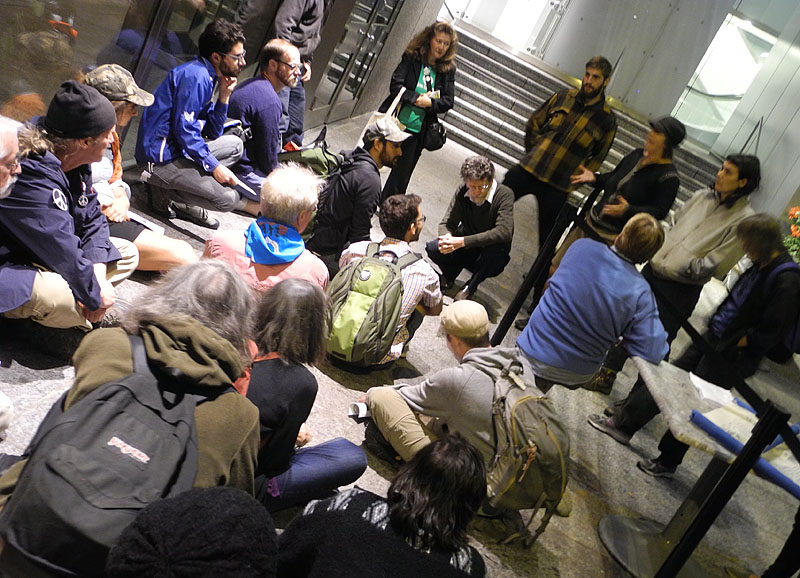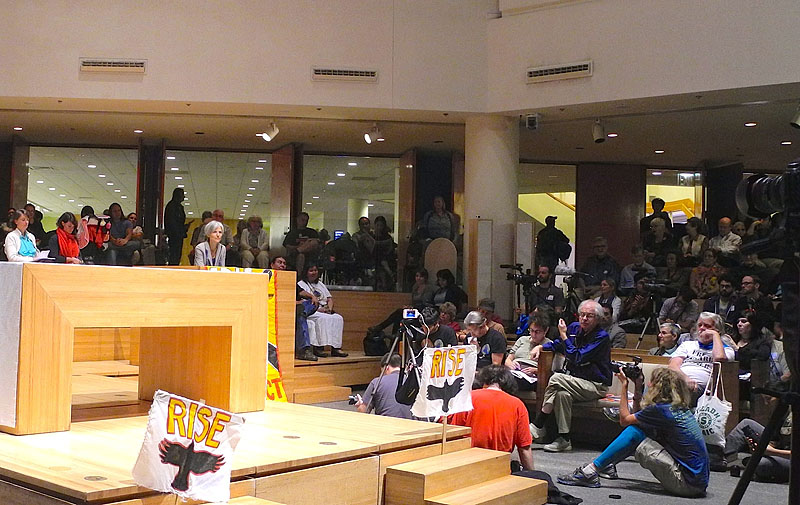
With a display of the full-throated, unabashedly leftist critique usually absent from American policy discussions, the NYC Climate Convergence conference kicked off last night at St. Peter’s Church in Midtown Manhattan with a diverse lineup of speakers who all sought to reframe climate change as a social justice issue. Through the two hours of talks — which often prompted prolonged applause from the more than 300 attendees in the hall and a video overflow room — ran a deceptively simple theme: “System change, not climate change.”
“We need to connect the dots,” said Jill Stein, the 2012 Green Party presidential candidate, who served as emcee and introduced the five speakers. It is impossible, Stein argued, to address climate change within a context of neoliberal capitalism and unfettered corporate self-interest, but that through building a collective, human-focussed movement change is possible. “The moment we get together we are an unstoppable force. The name of the game is coming together and overcoming this framing of divide and conquer.”
That’s the aim of Climate Convergence, which has leveraged the People’s Climate March on Saturday to bring together hundreds of scholars, unionists, artists and activists from around the world for a two-day series or talks and workshops exploring how communities around the world are building transformative alternatives and, according to their web site [convergeforclimate.org], to “build and strengthen an environmental movement that addresses the root causes of the climate crisis.”
The evening began with an introduction by the Indigenous Environmental Network and a blessing delivered by water walker Josephine Mandamin, who focused on the link between the water she ceremonially carries and the health of the Earth. “One day, the earth will be clean,” she said. “This is the work that has been left for us to do.” The climate comprises every drop of water, and, “That little droplet of water unites us all.”
Ann Petermann of the Global Justice Ecology Project stepped through the history of failed efforts of previous United Nations conferences to achieve meaningful international agreements. Outside pressure, she argued, was the only way to push for change. “I’m very excited about what’s going to be happening this week around the UN Summit,” she said, citing the Flood Wall Street action planned for Monday. “Direct action is the antidote for despair.”
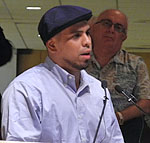
Hip-hop artist Immortal Technique (Felipe Coronel) talked about his personal journey from Peru to Harlem, and the critical need to be “proactive in our progressiveness” across all the intersectional oppressions that contribute to climate change. “We are human beings who have been conditioned to believe in a non-sustainable system,” he said, “The people who are ruining our planet are not going to be the people who fix it.” He closed with a devastating rap, “Sign of the Times.”
Erica Violet Lee of Idle No More stressed the very direct threat to indigenous people from tar sands work in Canada. “To get to the oil-rich lands, they need to move our families out of the way,” she said. “The intent of Idle No More is to draw awareness to the legacy of colonial and paternalistic policies.”
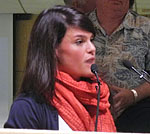
Nastaran Mohit, a New York labor organizer, challenged attendees to move beyond conferences and marches, and drew pointed illustrations from her work with the people of the Rockaways, an 11-mile long peninsula in Queens devastated by Hurricane Sandy. “Some of the poorest neighborhoods in New York City had the roofs ripped off them,” she said. “Sandy was the first time that Occupy activists had the opportunity to connect with low-income and marginalized communities. As beautiful a movement as Occupy was, it lacked that connection.” She described the difficult, sometimes painful work that volunteers had to do.
“As a labor organizer,” she said, “I look at unions. The New York State Nurses Association sent out hundreds of volunteers, canvassed hi-rise buildings, met some of the most frightened residents. What those nurses came back from that experience knowing, they saw first-hand how frightening it is when a climate catastrophe hits New York.”
“What did you do to help?” She asked attendees; not, she said, to induce guilt, but to prompt consideration of what meaningful action requires. “Am I willing to be uncomfortable? Am I willing to really go out and connect with these folks who are on the front lines of climate change?”
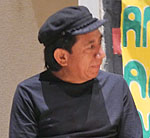
The evening’s final speaker, Oscar Olivera, talked about the work which won him the 2001 Goldman Environmental Prize: building a coalition which successfully overturned the privatization of water distribution in Cochabamba, Bolivia’s third-largest city. He drew a parallel to the United States: “Cochabamba is in Detroit right now.”
There are two interlinked challenges, Olivera said, communication and organization. “When the water was privatized,” he said, “There was a law, there was a contract, and the people did not understand anything. Our biggest challenge was how do we make this technical economic language simple for people to grasp.” Second, he said, “We have to have new means of organizing against that whole cadre of business that are threatening our environment. The only way to prove to those in power that we exist, the only way they will understand us is by mobilizing.”
In Cochabamba, he said, “We didn’t just recover water as a public good, we recovered politics, and for us, politics means our collective capacity to make decisions for today and the future.”
He urged attendees to recognize their responsibility, as people from the North who maintain the largest military, the largest transnational corporations, and the highest consumption. He closed by asking attendees to “Commit not only to resist, but to re-exist.” “We pledge to be like water, transparent and in movement,” he said. “We promise to be like children, joyful and creative. We promise to believe that the power is within us — without leaders, without parties, without bosses. Hasta la victoria.”
After the event, a group from FloodWallStreet.org conducted a training outside the church for a group of about 30 activist volunteers for a direct action that will take place on Monday morning at the New York Stock Exchange. Aiming to spotlight the threat to Lower Manhattan from climate change, the group plans to dress in blue and mimic the flooding that crippled the area in the wake of Sandy. Watching the volunteers “Surge and sit” offered an eerie, powerful echo of Olivera’s call to “be like water.”
